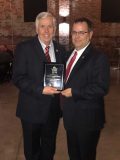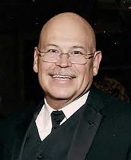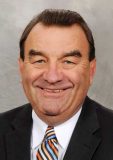Last year about this time, Dan Shaul told The Shelby Report that while the General Assembly had done some good work in 2017, it could have done a whole heck of a lot more. This year, that heck of a lot more got done, and there is more to come.
A lot of work got done despite the scandal surrounding former Gov. Eric Greitens. This is not the place to rehash what happened, except to say that Greitens was threatened with impeachment over an admitted extramarital affair and accusations of misusing a charity donor list. Greitens resigned rather than face impeachment by a General Assembly determined to remove him from office. With that out of the way, Mike Parson, previously Missouri’s lieutenant governor, officially took the state’s top office on June 1.
Shaul, who is executive state director at the Missouri Grocers Association (MGA) and a Missouri state representative, said that this year’s General Assembly session was “probably one of the most successful in the state’s history.
“We passed more bills—more constructive bills—than we have in the past that brought about significant changes both for people and businesses in the state, all with the distractions of Gov. Greitens and his legal issues,” Shaul told The Shelby Report.
Shaul broke down some of those bills and their implications for MGA’s members and businesses in general in the state.
Top on the list of accomplishments was the reduction of the state’s corporate tax from 6.25 percent down to 4 percent. In a close second was the reduction of the state’s personal income tax rate from 5.9 percent to 5.5 percent. It has the potential to fall even further, to 5.1 percent.
Those measures are “huge,” Shaul said. “Both things will bring economic gain here in the very short future.”
But wait, there’s more. As Shaul said, “sometimes it’s not what you pass, it’s what you don’t pass.”
Missouri retailers retain 2 percent for their efforts to maintain the infrastructure to collect state sales taxes. For every $100 collected, retailers keep $2.
“That was under fire the entire session, and it was slated to be completely removed so the retailer would have gotten nothing,” Shaul said. “We were able to negotiate a fallback position but, in the end, we were able to negotiate that the General Assembly would leave the collection allowance alone and recognize that that was a fair and just cost for the retailers to perform the duties of the state in collecting taxes.”
That is another huge win. For some retailers, the collection allowance can run into six figures.
Shaul praised David Overfelt, president of the Missouri Retailers Association, as well as retailers who made one-on-one connections with legislators, for their part in the victory. Retailers were able to share what would happen if the allowance went away, including higher prices and cuts to services they provide to their local communities.
“It was huge that we got the corporate tax, but then we didn’t have to pay for it with our 2 percent, which was probably the biggest win we’ve had since I’ve been with the grocers,” said Shaul, who in June celebrated his 20th anniversary with MGA. “And that was immediate. Several of our retailers would have felt that immediately on their bottom line.”
Another important measure included liability adjustments for Missouri businesses.
“Our retailers do everything to provide the best, safest place for people to shop, but sometimes things will happen that are beyond our control,” Shaul said. “If one of our retailers has done everything they’re supposed to do to provide a safe shopping experience and someone comes in and does something that is heinous and outside of the retailer’s control, then they’re not liable for that. So that ‘liability of unpreventable criminal acts,’ SB 608, was huge as well.”
The General Assembly also modernized the state’s electrical infrastructure. Instead of rate increases of 8, 9, 10 percent each year, Shaul said they should drop to about 3 to 4 percent.
“For several of our retailers that get power from an investor-owned electrical service, we were able to put some rate caps in place but yet allow the electrical companies to modernize their grid, have a more stable and reliable grid, cheaper transfer of power throughout the state, and I think that’s going to have huge impact in the future,” Shaul said.
The business-friendly success the general assembly had this year will be hard to top in 2019. Efforts next year will include more work on tort reform, “so the money can stay in the retail environment and not on the lawyer’s side of the balance sheet,” he said.
“I was very pleased with the way the General Assembly operated this year and the way that they acted like adults with the distractions and also with the legislation,” Shaul said. “It was a very exciting year. And I think we’re poised for a good, successful 2019.”
A friend in the mansion

In Mike Parson, MGA has a friend in the governor’s mansion. Shaul said MGA has had a strong relationship with the former lieutenant governor.
“Our position is very well understood inside the executive branch and it will stay that way,” he said. “Missouri Grocers has made some great strides in making sure that we have connections throughout, not just the legislative branch but also the executive branch, and I think it is paying great dividends as it did this year and, hopefully, next year.”
He added that once a new lieutenant governor is appointed to take Parson’s place (which had not happened yet when he spoke with The Shelby Report), Shaul expects that same relationship will be in place.
MGA presented Parson with its Capitol Impact Award during its annual legislative dinner, which was a part of its Grocers Day at the Capitol event on Feb. 27. While he was lie,tenant governor, Parson was recognized as being a pro-business legislator. He also was recognized for a new “Buy Missouri” initiative that launched this year. Buy Missouri strives to encourage consumers to purchase products made in Missouri. Shaul has been personally involved with Buy Missouri since its beginning.
“Programs like this have been tried before in the state, but we lacked a central figure like (Parson),” he said. “Missouri Grocers has been a huge supporter of this from Day One—before it was even announced—and we’ll be with the Buy Missouri program at our show and also at the state fair. We’ve been assured that the program will continue even though the lieutenant governor is moving to the governor’s office. We also were able to get a ‘Buy Missouri Week’ in October passed through both chambers and we will wait for the new governor to sign it.”
Gott, Mullins to be honored

MGA will hold its 2018 Showcase July 19-21 at Tan Tar A Resort in Osage Beach. Its theme is “Embracing the Change: The New Era of Food Retail.” The format has changed a bit. It was shortened by a day—something Shaul said members and vendors requested.
“We’re trying to be very aware of their time and make sure every moment is worthwhile to them, and I think we’ve achieved that,” Shaul said.
At the Showcase, MGA will honor the late Dennis Gott, Town and Country Supermarkets, and Ed Mullins, Prairie Farms Dairy. They will be inducted into the MGA Hall of Fame.
“What a tragedy a few years ago when Dennis Gott passed,” Shaul said. “We spoke with the family and several of his colleagues and we think it’s time to honor what he contributed.”

Shaul said that like with so many grocers, “sometimes it’s not incredibly obvious today but tomorrow, when you look back you see how much they did, how much they gave their community, how much they gave to the industry.
“And they don’t ask for any accolades or any award but they just go about doing their business, and I think that fits Dennis Gott—that was him,” he added. “He didn’t want the spotlight. He just did what was best for his company and the industry and then went on about his business. I think it’s the right time and place to honor him.”
Mullins, who is Prairie Farms’ CEO and EVP, has been a “rock solid supporter of the industry,” Shaul said.
“Their dairies are one of the first to help retailers, first to show up in disasters, last to go home. They’re the ones there making sure that their products are there. They do a great job for the industry, great job for the association,” he said. “From a personal point of view, I consider Ed Mullins a mentor. He’s a great individual and he’s known both my father and grandfather, and I couldn’t be happier with our awards this year.”
Defining ‘meat’
Missouri is the first state in the nation to undertake defining “meat.” The previous definition of meat in Missouri statutes was: “any edible portion of livestock or poultry carcass or part thereof.” This definition excludes plant-based or even laboratory-grown food products from being considered meat.

But Missouri Cattlemen’s Association (MCA) EVP Mike Deering said the problem is there was nothing definitive in state statute to prevent the misrepresentation of laboratory-grown meat products as meat. The legislation that now has been signed by Gov. Parson prohibits “misrepresenting a product as meat that is not derived from harvested production livestock or poultry.”
Parson is a cattle farmer in Polk County. Deering said this is the first time he remembers a farmer being the governor of Missouri.
Deering said the association does not oppose plant-based or laboratory-grown food products.
“This legislation does not stifle technology, but it does ensure the integrity of our meat supply and reduces consumer confusion. We must ensure that those products do not mislead consumers into thinking those products are actually meat produced by farm and ranch families,” he said. “The use of traditional nomenclature on alternative products is confusing to consumers and weakens the value of products derived from actual livestock production.”
The bill, which passed with bipartisan support, defines meat as products “derived from harvested production livestock or poultry.” Shaul supported the measure. He said that instead of letting “the left and right coasts dictate what meat is, I believe Missouri has decided that they want to have some control over the definition.
“I think it’s going to be interesting to see how it plays out in the future,” Shaul added.
The definition of meat may be considered on the federal level as well.
Keep reading:
Dollar Tree Opens $110M Distribution Center In Warrensburg, Missouri
https://www.theshelbyreport.com/2018/07/02/beyond-meat-triples-production-capacity/
https://www.theshelbyreport.com/2018/05/31/yesway-reaches-100-store-milestone/

